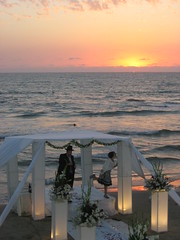Mr. Ben has photos up from our tour through Israel on his Flickr page, as well on the Book Face. They show an experience of extremes: tranquil scenes on the Sea of Galilee and refugee camps in Jerusalem; old churches and modern beaches; desert hikes and a Netanya wedding for one of the most beautiful brides I’ve ever seen, the sick-but-beaming, accommodating*, eminently-deserving Tamar.
Well, that’s the holy land for you.
And now for a short tangent:
Who among you hates the subject of Israel/Palestine? Could I get a “whoop, whoop!” please? Certainly I’m not the only one.
The subject has been coming up persistently over the last month or so, mostly in my office but also, of course, in the news. Without getting into the details, I can say that it’s been frustrating, and I have had to talk to and/or listen to people who do not meet my stringent standards for conversation on the topic.
What are my stringent standards? I’m so glad you asked:
1) No Bumper Stickers. I am thoroughly uninterested in anyone whose thoughts on the subject can be summed up by two words and an exclamation point, unless those words are “It’s complicated!”
2) No Assholes. Do you write emails in Comic Sans bold? Do you roll your eyes and/or sigh heavily a lot anytime anyone else talks? Do you refuse to admit when you don’t know enough about a subject to venture an opinion? Then go talk to a message board filled with your compatriots, friend, and stop making my ears bleed.
With that in mind, I was a bit nervous about heading over to Israel. As it turned out, I needn’t have been: I’m a lot more comfortable talking Israel/Palestine politics while in the neighborhood, so to speak. Maybe it’s because, if my discussion buddies are there too, that testifies to a certain level of understanding and commitment to the issue? I’m not sure. At any rate, Mr. Ben and I talked to each other, international strangers in our Tel Aviv hostel, and folks on our Im Amim tour, and we never had a problem. That was a significant relief.
Politics aside, we had a wonderful time. I’m not quite sure I’m ready to be home, to tell the truth. And seeing Tamar get married to a great guy ten years after we lived in Israel together, and spent most of our time moping to the Indigo Girls, was a nearly-transcendental experience. A whole cluster of us traveled over from the US to celebrate with her — and that included improvising a mikvah experience** in the Mediterranean Sea at sunset and fetching chairs for the hora and finally cutting the neglected wedding cake and dancing to techno remixes until our legs collapsed beneath us. I am so privileged to have gotten a chance to be there.
*This is not flattery. The huppah started an hour late, after the sun had already set; the rabbi overfilled the ceremonial glass of wine (red, not white), and then splashed it on Tamar’s wedding dress; the cake was forgotten about until after the guests had left; and yet despite these, and other provocations, Tamar remained radiantly graceful and happy. What’s the opposite of a Bridezilla? A BrideTeresa? The world needs a new word.
**The Hebrew word for immersion in a mikvah, “t’vilah,” is the same verb used for immersion in baptismal waters AND for immersion in water that leads to drowning. That sums up a pretty complex and crazy country, doesn’t it?

I missed you even more than usual.
I've just taken to refusing to speak about I/P. Better for the blood pressure.
yeah, my white south african family members said they always hated when people talked about the ISSUE of apartheid. it was complicated then, too. why should they have to give up their safety and their protected employment?
Whoa there, cowboy. If you're going to come out shooting, at least have the courage to identify yourself.
you're right, i'm sorry for posting anonymously earlier. i will be more polite now, and explain that it just makes me so frustrated to see jews of conscience who do not speak out about israeli apartheid because it is "complicated". all issues are complicated; this does not excuse us from taking a stand. my family does include white south africans as well as israeli jews. i made the comparison to south african apartheid because people really did make these kinds of arguments back then, too, and i think hindsight makes it easier to see what was wrong with them then.
Hey Jake,
Thanks for coming back — I appreciate it. I hear what you're saying. Still, I think that using a culturally-specific, very loaded word like "apartheid" to describe the situation in I/P is like hitting a hot button issue with a sledgehammer. It doesn't help much, and it gets everyone on all sides up in arms.
More importantly, to me, "apartheid" doesn't precisely describe what's going on — though I respect that you feel differently. The situation on the ground as I saw it, and as I understand it, really *is* complicated. I'm not using the word as an umbrella to deflect all criticism or responsibility; of course both are crucial. My use of it as a test is in view of the fact that I prefer to engage in dialog with people who acknowledge the historical, geo-political, and religious complexity of what's going on.